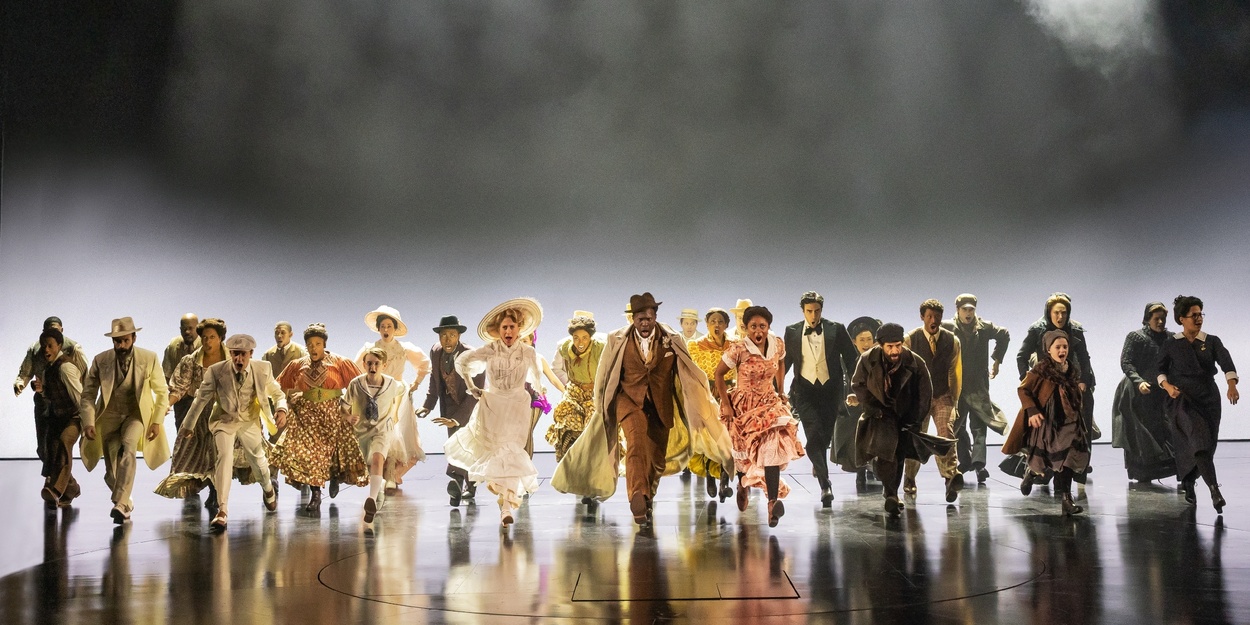The curtain rises tonight on Ragtime, opening at the Vivian Beaumont Theater as Artistic Director Lear deBessonet’s first production of her inaugural season at Lincoln Center Theater. The beloved Tony Award-winning musical, features music and lyrics by Stephen Flaherty and Lynn Ahrens and a book by Terrence McNally. Read the reviews below!
The production stars Tony Award nominee Joshua Henry as Coalhouse Walker, Jr., Olivier and Grammy Award nominee Caissie Levy as Mother, and Tony Award winner Brandon Uranowitz as Tateh, alongside Colin Donnell, Nichelle Lewis, Ben Levi Ross, Tony Award winner Shaina Taub, Anna Grace Barlow, John Clay III, Rodd Cyrus, Nick Barrington, and Tabitha Lawing.
They are joined by an accomplished ensemble including Nicholas Barrón, Lauren Blackman, Allison Blackwell, Briana Carlson-Goodman, Jordan Chin, Eean Sherrod Cochran, Billy Cohen, Kerry Conte, Rheaume Crenshaw, Ellie Fishman, Jason Forbach, Nick Gaswirth, Ta’Nika Gibson, Jackson Parker Gill, David Jennings, Kaleb Johnson, Marina Kondo, Morgan Marcell, Kane Emmanuel Miller, Jenny Mollet, Tom Nelis, Kent Overshown, Kayla Pecchioni, John Rapson, Matthew Scott, Ellie May Sennett, Deandre Sevon, Jacob Keith Watson, and Alan Wiggins.
As previously announced, the company will record a new cast album later this month, produced by three-time GRAMMY winner Sean Patrick Flahaven and four-time GRAMMY nominees Lynn Ahrens and Stephen Flaherty. Further details on release dates and pre-orders will be announced soon.
Featuring a lush Tony Award-winning score and original orchestrations by William David Brohn, Ragtime interweaves fictional and historical figures to tell a story of love, justice, and change in early 20th-century America. The musical follows three families—Coalhouse Walker, Jr. and Sarah, a Black couple confronting racial injustice; Tateh, a Jewish immigrant seeking a better life for his daughter; and a privileged white family led by Mother, awakening to the shifting social landscape. Each is in pursuit of the American Dream, struggling to hold onto it in a rapidly transforming nation.
Ragtime is now playing at the Vivian Beaumont Theater at Lincoln Center Theater.

Laura Collins-Hughes, The New York Times: *CRITIC’S PICK* As the plot follows the intersecting fortunes of those three characters’ families, each seeking to redeem the country’s promise at a time of tumultuous change, old-fashioned musical-theater pleasures are very much on offer: a multitudinous cast clad in sumptuous costumes; riveting vocals undergirded by a 28-piece orchestra; a sprinkling of spectacle descending from above and rising from below. It works as rousing entertainment, full stop.

Jackson McHenry, Vulture: The fantasy of endless space is what matters, a great chimeric promise, this production understands, that both sustains the nation and goes unfulfilled. Even America has an end. Ragtime, with its thudding sentimentality, is not a truly great musical, but deBessonet has enough finesse to convince you that it might come close.

Charles Isherwood, The Wall Street Journal: Standing ovations on Broadway are so common you might imagine the seats have been booby-trapped to eject patrons as the curtain calls begin. But at a recent performance of the brightly shining revival of “Ragtime,” the ovation came early—actually two came early—so transported was the audience by the emotional and musical potency of this panorama of America at the turn of the 20th century.

Frank Rizzo, Variety: In productions large or small — or, here, imperfectly in-between, though still glorious — everything is the service of the show that creates with words, music and movement a grand American tapestry — tears and all.

Shania Russell, Entertainment Weekly: Here we have a show that examines where we are as a nation, and just as it did half a century ago, finds us wanting. It asks the very questions that have been front of mind over the past few weeks, months, years. It agonizes over the American Dream, debates the merits of political violence, slams the mistreatment of immigrants, prods at gender inequality, and grapples with grief. It does so while preaching hope for a brighter future — then thrusts its audience into that future, their present, a maddening contradiction. Ragtime isn’t the kind of show you walk out of unscathed, not if you’re really paying attention. Grade: B

Chris Jones, Chicago Tribune: Better yet, the new focus plays into the strengths of an empathetic cast that sings the bejesus out of these famous songs. Joshua Henry’s Colehouse feels younger than typical, less initially polite, more impassioned and, of course, his voice is the stuff of standing ovations. Nichelle Lewis’ Sarah is more fragile, which makes her crushed optimism especially moving. As Tateh, Brandon Uranowitz focuses on energetic joy. He expands the role and makes it all the more essential to the piece. Both Lewis and Ben Levi Ross, who plays the brooding Mother’s Younger Brother, bring qualities to those two characters I’ve never seen before. They are doing the best work of the night; Ross, especially, fleshes out what mostly has been a caricature.

Adam Feldman, Time Out New York: DeBessonet’s elegant direction contributes to the clarity. This is the same production that she premiered in semi-concert form last year at New York City Center (and which we discussed in an interview then), newly outfitted with a spare, effective set by David Korins and attractive abstract projections by 59 Studio. The very fine 2024 design team is otherwise intact: Linda Cho (costumes), Tom Watson (hair), Adam Honoré and Donald Holder (lights) and Kai Harada (sound). The beautifully full orchestra, led by music director James Moore, plays William David Brohn’s original orchestrations; Ragtime is not dance-driven, but choreographer Ellenore Scott keeps things moving when appropriate.

Matt Windman, amNY: Nichelle Lewis’s Sarah is heartbreaking, and she sings “Your Daddy’s Son” with raw, aching vulnerability. Ben Levi Ross captures Younger Brother’s naivety and the fervent militancy with which he hurls himself into causes. Shaina Taub makes a sharper, funnier Emma Goldman this time around, with her vocals far stronger than last year. Overall, the cast imbues the piece with life and cohesion, embodying the full scope of America’s promise and pain.

Greg Evans, Deadline: But whatever its faults and near-misses, Ragtime has always been, like its ’90s contemporaries Titanic and Parade, an opportunity for rediscovery. DeBessonet takes the challenge and wins, rescuing a near-classic from the excesses of the 1990s to prove, once and for all, that Ragtime, imperfect as it may be, deserves a place among the most significant musical theater achievements of that decade.

Roma Torre, New York Stage Review: The imagery gets a big boost from lighting designers Adam Honoré and Donald Holder’s exquisite palette attaching distinctive shades of light to each of the main groups, and framing them in monochromatic bands painted overhead. And costumer Linda Cho did a terrific job expertly evoking the period, the class and the temperament of the characters. But even without the technical enhancements, the production would still soar given the bravura talents – all 41 actors and 28 musicians – gracing the Vivian Beaumont stage.

Melissa Rose Bernardo, New York Stage Review: Classism, systemic racism, the immigrant experience—none of that screams “musical!” But Ahrens, Flaherty, and McNally managed to work it all in without preaching or lecturing (all three won Tonys for their efforts). You could argue that the characters are one-dimensional, but that’s on E.L. Doctorow, whose 1974 novel Ragtime is almost a collection of snapshots to memorialize historic moments—for instance, the creation of the assembly line. And for those who say the show moves too slowly (it clocks in at 2 hours 50 minutes), composer and pianist Scott Joplin, aka the King of Ragtime, says this in a preface to Doctorow’s book: “It is never right to play Ragtime fast.”
 Robert Hofler, The Wrap: “Ragtime,” like “Les Miz,” gives anthems a very bad name. DeBessonet emphasizes their excessiveness by having her cast, especially Joshua Henry in the Coalhouse role, hold on to a note well passed its sell-by date. It’s difficult to tell if people are applauding mid-song because they’re impressed by Henry’s lung power or if they just want him to get off the note and finish the song. DeBessonet’s blunt direction only encourages us to applaud before the actors have finished singing.
Robert Hofler, The Wrap: “Ragtime,” like “Les Miz,” gives anthems a very bad name. DeBessonet emphasizes their excessiveness by having her cast, especially Joshua Henry in the Coalhouse role, hold on to a note well passed its sell-by date. It’s difficult to tell if people are applauding mid-song because they’re impressed by Henry’s lung power or if they just want him to get off the note and finish the song. DeBessonet’s blunt direction only encourages us to applaud before the actors have finished singing.

Joe Dziemianowicz, New York Theatre Guide: The bare-bones staging keeps the focus squarely where it counts: on the cast of nearly 40, who are uniformly topflight and in sync when it comes to sparking emotional electricity. The simplicity of the production provides breathing room in a megamusical that often exhilarates, but also drains because of its tendency to always think bigger.

Matthew Wexler, One-Minute Critic: Ragtime, one of the great musical theater scores of the late 20th century, steps up to bat on Broadway in its third major production. And if some of its design elements feel sparse in Lincoln Center Theater’s 1,050-seat Vivian Beaumont, its glorious cast of 34 and “the music of something beginning” land with a visceral impact that marks a uniquely American art form.

Rob Weinert- Kendt, America Magazine: Still, the mantle of “relevance” is a heavy thing to lay on a Broadway musical. An earlier version of this same staging, also by director Lear deBessonet, ran at the Encores! series last November in the weeks before and after the U.S. presidential election, and depending on when audiences saw it, they felt either the show’s bursts of hope or its cries of despair with a fresh immediacy. Seen now, it plays less like a reflection of the breaking news outside the theater’s doors than like a dead-serious fable, speaking not so much to our precise present moment as to the perennial national questions this moment raises.

Brian Scott Lipton, Cititour: Although many people may recall the opulence of the original Broadway production, this more minimalist version is frankly more effective, allowing one to focus on the plot and the performances. David Korins’ set is decidedly but intelligently spare, relying primarily on two large stepladders and a few well-chosen set pieces (including a Model T Ford). Linda Cho’s period costumes are quite impressive. Adam Honore’s lighting design and 59 Studio’s projection designs both help fill the vast Beaumont stage. Finally, Ellenore Scott’s spot-on choreography is thoughtful and often makes up for the lack of scenery. Yes, it’s sad that 2025 proves to be the right time for “Ragtime,” but that doesn’t mean you should pass up the chance to witness this truly unforgettable production.

Johnny Oleksinki, The New York Post: It still is. She doesn’t have a mastery of the Beaumont’s huge thrust yet. And so this is an overly presentational staging in which actors other than Ross struggle to connect to one another, which is partly why the experience is mostly unmoving even as songs desperately beg us to cry.

Thom Geier, Culture Sauce: But this is no lumbering pageant. Despite the overstuffed plot, you find yourself getting caught up in the plight of characters whose efforts to get ahead in life are thwarted by prejudice and whose response to the obstacles they face varies from quiet persistence to anger to vengeance. DeBessonet’s thoughtful staging underscores why Ragtime is still worth revisiting. As we approach the country’s 250th anniversary, it’s good to remember that harmony can only happen when we bring disparate voices together, and that doing so is a public act worth cherishing. And preserving. Great music can grease the wheels of the American Dream.

Deb Miller, DC Theater Arts: Lincoln Center Theater’s revival of Ragtime is Broadway at its very finest, a top-notch production of an American classic with stellar performances, direction, and human themes that touch, entertain, and remain relevant, in their clear connection between then and now. Don’t miss it – and be sure to bring tissues for its most heartrending and shocking scenes.

Lane Williamson, Exeunt: Director Lear deBessonet understands, and respects, that the writing must be central to this production’s success. Too many revivals become opportunities for revisions, permitting the writers to tinker with things that don’t need adjusting. Thankfully, Ahrens, Flaherty, and McNally’s estate have left things as they are and deBessonet’s production presents their stunning achievement in nearly barebones fashion.

Jonathan Mandell, New York Theater: As at Encores, the three principal cast members carry us through the swirl and the sprawl, with their credible, impassioned performances and their golden voices; it helps that each is given some of composer Stephen Flaherty’s most distinctive songs, reflecting their character’s individual personality and culture. One can question whether “Ragtime” will be considered one of the great American musicals and still feel grateful to have been able to witness Joshua Henry, the Baritenor of Broadway, deliver a shattering “Make them hear you.”

Average Rating:
82.4%
.

